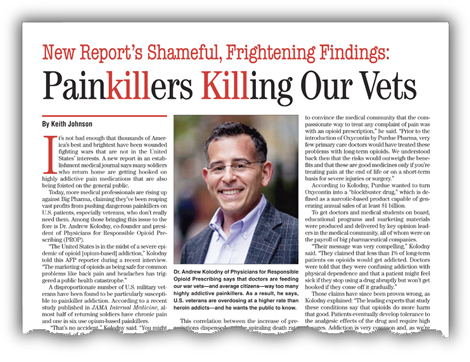
By Keith Johnson —
It’s not bad enough that thousands of America’s best and brightest have been wounded fighting wars that are not in the United States’ interests. A new report in an establishment medical journal says many soldiers who return home are getting hooked on highly addictive pain medications that are also being foisted on the general public.
Today, more medical professionals are rising up against Big Pharma, claiming they’ve been reaping vast profits from pushing dangerous painkillers on U.S. patients, especially veterans, who don’t really need them. Among those bringing this issue to the fore is Andrew Kolodny, M.D., co-founder and president of Physicians for Responsible Opioid Prescribing (PROP).
“The United States is in the midst of a severe epidemic of opioid [opium-based] addiction,” Kolodny told this reporter during a recent interview. “The marketing of opioids as being safe for common problems like back pain and headaches has triggered a public health catastrophe.”
A disproportionate number of U.S. military veterans have been found to be particularly susceptible to painkiller addiction. According to a recent study published in the Journal of the American Medical Association Internal Medicine, almost half of returning soldiers have chronic pain and one in six use opium-based painkillers.
“That’s no accident,” Kolodny said. “You might have heard of the slogan: ‘Pain as the fifth vital sign.’ That was a campaign launched by the American Pain Society with funding from pharmaceutical companies. They targeted the Veterans Administration system in particular and got them to more aggressively screen and treat [military personnel] with narcotics for pain.”
Kolodny continued: “Returnees from Iraq and Afghanistan tend to have multiple medical issues and get addicted during treatment. They can always get a doctor from the VA to give them as many pills as they want. The interesting thing is, their overdose death rate is actually higher than [non-military] people who turn to heroin after their doctors stop prescribing them large enough quantities of pills to support their habit.”
In a separate report appearing in The American Journal of Public Health, Biomedical Ethics Professor Nicholas B. King recently found that since 1999, “sales of prescription painkillers to U.S. hospitals, clinics and pharmacies increased fourfold, with an accompanying increase in opioid-related mortality.”
This correlation between the increase of prescriptions dispensed and the spiraling death rate has a pronounced and sordid history, as Kolodny went on to explain.
“Beginning in the late 1990s, there was a brilliant marketing campaign by pharmaceutical companies to convince the medical community that the compassionate way to treat any complaint of pain was with an opioid prescription,” he said. “Prior to the introduction of Oxycontin by Purdue Pharma, very few primary care doctors would have treated these problems with long-term opioids. We understood back then that the risks would outweigh the benefits and that these are good medicines only if you’re treating pain at the end of life or on a short-term basis for severe injuries or surgery.”
According to Kolodny, Purdue wanted to turn Oxycontin into a “blockbuster drug,” which is defined as a pharmaceutical product capable of generating annual sales of at least $1 billion.
To get doctors and medical students on board, educational programs and marketing materials were produced and delivered by key opinion leaders in the medical community, all of whom were on the payroll of big pharmaceutical companies.
“Their message was very compelling,” Kolodny said. “They claimed that less than 1% of long-term patients on opioids would get addicted. Doctors were told that they were confusing addiction with physical dependence and that a patient might feel sick if they stop using a drug abruptly but won’t get hooked if they come off it gradually.”
Those claims have since been proven wrong, as Kolodny explained: “The leading experts that study these conditions say that opioids do more harm that good. Patients eventually develop tolerance to the analgesic effects of the drug and require high dosages. Addiction is very common and, as we’re now seeing, often leads to overdose deaths.”

Keith Johnson is a writer based in Tennessee. He can be contacted at [email protected].


In case any vet is reading this article, if you want an easy way to transition off of strong opiates without having to go through rehab, ask to be prescribed Suboxone.